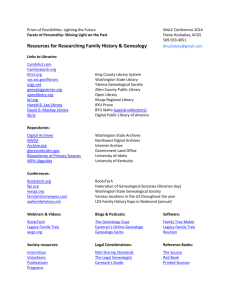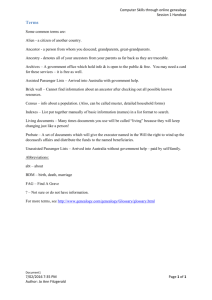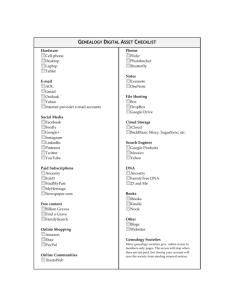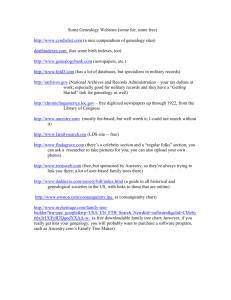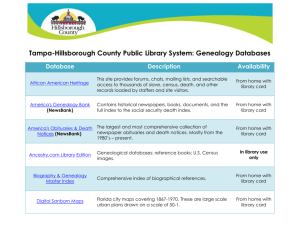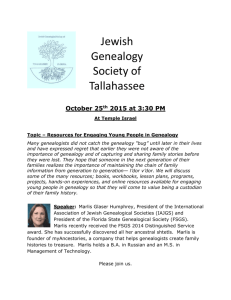Exploring Genealogical Roots and Family History and their Influence
advertisement
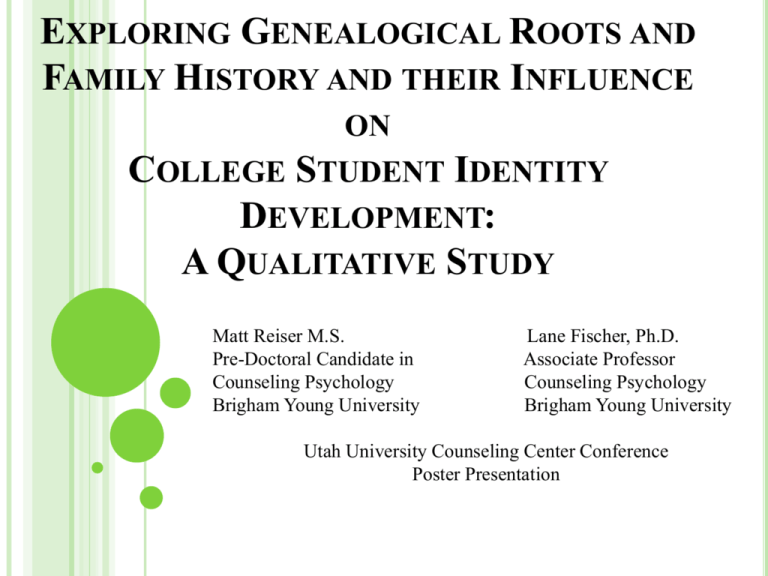
EXPLORING GENEALOGICAL ROOTS AND FAMILY HISTORY AND THEIR INFLUENCE ON COLLEGE STUDENT IDENTITY DEVELOPMENT: A QUALITATIVE STUDY Matt Reiser M.S. Pre-Doctoral Candidate in Counseling Psychology Brigham Young University Lane Fischer, Ph.D. Associate Professor Counseling Psychology Brigham Young University Utah University Counseling Center Conference Poster Presentation ABSTRACT For most young people, the years from late teens to early twenties represent a period of profound change (Arnett, 2000). Many youth search for and solidify their identity during the years they are attending college (Muuss, 1996). There have been very few, if any, research studies that have examined the influence of studying genealogy and family history and the impact it might have on identity development. This study focuses on the experiences of college-age students who have been searching out their own personal ancestry in an undergraduate class on family history/genealogy. INTERVIEWING PROCEDURES Interviewers used an open ended semi-structured interviewing method. The interviewers asked four questions to guide the interviewing process. Those questions were: 1) What was your experience in the family history course or conducting your genealogy research? 2) What moments particularly stand out in your memory from your experience? 3) What did you learn about your family that was new or impressive to you? 4) What do you understand about yourself now that you didn’t understand before you began to do genealogy research? The interviewers asked follow-up questions in the course of a normal conversation. The interviews were audio recorded and transcribed. DATA INTERPRETATION Kvale (2009) discussed the seven stages of data creation from a set of interviews: 1) thematizing, 2) designing, 3) interviewing, 4) transcribing, 5) analyzing, 6) verifying, and 7) reporting. Kvale also articulated five subprocesses associated with step 5 “analyzing”. Those processes include: categorization of meaning, condensation of meaning, structuring of meaning through narratives, interpretation of meaning, and ad hoc methods for generating meaning. Flick (2002) stated that in qualitative research, a multi-method approach is often used. I have listened to all of the interviews and this immersion has allowed appropriate analysis and verification. My goal was to capture the phenomenon as well as possible, realizing that the objective reality can never really be captured. My attempt to capture the phenomenon was through several methods. I categorized meaning in this study by creating an abridgement of the meanings expressed by the interviewees into shorter formulations. I condensed the meaning of the interviews by coding the statements in the interviews into categories. I used narrative structuring in analyzing the interviews which entailed the social and temporal organization of a text to bring out its meaning. “It focuses on the stories told during the interview and works out their structures and their plots” (Kvale, p 192). Additionally, I had an auditor who followed a similar process to ensure that my interpretations were consistent with her findings. RESULTS Several themes emerged as relevant to the participants’ experiences with genealogy/family history 1) Interest in genealogy/family history research 2) Connections, closeness, and bonds to ancestors 3) Physical and personality characteristics of ancestors found in posterity 4) Impact on Current Relationships from genealogy/family history research 5) Spiritual Experiences while researching genealogy/family history 6) Influence on Identity Development while participating in genealogy/family history INTEREST “I enjoy genealogy and I didn’t think I would enjoy it as much as I do. I wanted to find new information and I get excited when I do. Knowing my heritage is nice and the fact that I did come from somewhere. It is good to know where you are from because that is your foundation.” “I found a book of family history that was about 300 pages long when I was 14 years old. It dated all the way back to the 1500’s and I became fascinated with the book. I was amazed at what I found in this book.” CONNECTIONS, CLOSENESS, AND BONDS “My great-grandfather was always poor, enjoyed fresh fruit, and the simple things in life. However, he worked hard and if it weren’t for his sacrifice then I might not be here. I appreciate all of my ancestors’ sacrifices, and because of their sacrifice I feel a connection to them and more reason to live up to my heritage. They worked so hard and now I can give the same kind of sacrifice because of their examples.” “I felt alone in high school; sort of separated from my family. I would fight with my mom a lot. Family history is the opposite of that; it connects you to your immediate family and to everybody who has gone on before you.” PHYSICAL AND PERSONALITY CHARACTERISTICS “Well, I think that part of who I am, I want to say trickled down through generations. I can see how I’ve been raised and how come I’m like them. Doing research on them; I mean the only way I guess it affected me is it has helped me to realize their kindness and their attributes, and maybe that makes me want to be even more that way. But I think I just realized that the way that they were has trickled down to who I am.” “I get my big ears from my Romanian grandpa. He had big ears, and I remember as a little kid, my ears were huge, and everybody used to call me Dumbo. But I didn’t care, because my parents said that I had Grandpa Harry’s ears.” IMPACT ON CURRENT RELATIONSHIPS “When I found my great-grandfather in a census record in Pennsylvania in 1880, and found all of my mom’s dad’s brothers and sisters listed with her grandmother and grandfather; I called her and told her. She was almost in tears. She was really emotional. She said, ‘I never knew I could know that about my family.’ It was a really tender moment. It was really sweet. It was the break that I was looking for to have that kind of spiritual connection with my mom, where she felt a little bit of what I’ve been feeling all along. It was a neat thing, and now we talk once or twice a week, and it has been ‘the thing’ that I think has changed or helped our relationship.” “My mom gets excited about it and so does my dad, who’s not a member. He’s always asking me what I’ve found. I talk to my grandma, who is very anti-religion, but this family history thing she likes, and she wants me to bring copies of everything I’ve found next time I come see her [laughter]. So it strengthens those family relationships.” SPIRITUAL EXPERIENCES “I received my ‘endowment’ in the temple and then we did ‘sealings’. I felt really strongly that day that my grandparents, who were dead, were there that day. That was a great day; a special day. I feel that they are very close all the time.” “For my family history project I found a missionary journal of my great-grandfather who had served a mission in the Southern States of the United States. Every time I would pick up that journal, the message would be for me. He’d say something in his journal that would touch me and testify to me that the gospel is true and that Satan is there to try and deter us away from the truth. So when I would read those things it would strengthen my testimony, and it would give me the strength to keep pushing forward. I remember feeling his presence at times, and realizing that he was invested in my life. He cared about me not losing my faith in the gospel.” IDENTITY DEVELOPMENT “Identity is something that’s very interesting to me, and it’s something that I’ve felt drawn towards. I feel like this is really a time in life, where I’m trying to figure out who I am. It’s something that I’ve been aware about for a good portion of my life, and I’ve been searching out more who I am; what my purpose is here in this life. I’ve felt like God’s directed me in many circumstances, to lead me, since that’s the desire of my heart. He also wants me to find out more about who I am, and how I can contribute to his work. I have a testimony that I’m here for a specific reason. It is a joy, uncovering that person, because I feel like a large part of who I am is because of my ancestors. As I’m searching more out about my ancestors, I feel like I become closer to God and then further understand who I am . I feel like there is such a connection between identity and family history.” MORE IDENTITY QUOTES “I think that I’ve just had more confidence in who I was and the way I did things because I know about my ancestors. At the same time I’ve also realized that this might be a weakness, and it’s something that I can work with. I think studying family history has helped me to be more open to other people, and how they are; and be more accepting of them, and more accepting of myself.” “I think that family history benefits me as I gain more knowledge of my family, then I have a stronger identity of who I am, which sounds kind of strange at how that works out. Just knowing where you came from, it really helps you understand who you are.” DISCUSSION I was surprised at how passionate these participants conveyed their experiences in engaging in genealogy/family history. There continues to be a growing interest in genealogical research across the world. Some participants began their exploratory genealogical journey at very young ages. It seemed as though there were several of the participants whose identity and sense of self had been influenced by their participation on genealogical research. Others have used family history research to “heal” current relationships. Limitations to the study were that we used a semi-structured interviewing process and may not be able to generalize our findings to the entire college student population. Future research could explore the benefits of using genealogy/family history in family therapy, counseling psychology or another form of therapy focusing on identity development or family dynamics. Family genograms used in clinical interviews and applications to career counseling are other possible areas of potential research. REFERENCES Arnett, J. J. (2000). Emerging adulthood: A theory of development from the late teens through the twenties. American Psychologist, 55, 469-480. Arnett, J. J. (2004). Emerging adulthood: The winding road from the late teens through the twenties. New York: Oxford University Press. Barton, P. E. (2002). The closing of the education frontier? Princeton, NJ: Educational Testing Service. Brough, M. J. (1995). Search for Identity. Ensign, p. 41. Brough, M. J. (1996). The Message: Who Am I? New Era, p. 4. Champagne, D. E. (1990). The genealogical search as a counseling technique. Journal of Counseling and Development 69(5), 85-87. Chance, S. (1988). The psychological functions of genealogy in the aged. Journal of Geriatric Psychiatry and Neurology, 1(4), 113-115. Chickering, A. W., & Reisser, L. (1993). Education and identity. San Francisco: Jossey-Bass. Erikson, E. (1950). Childhood and society. New York: Norton. Erikson, E. H. (1968). Identity: Youth and crisis. New York: W. W. Norton & Co. Flick, U. (2002). An introduction to qualitative research (2nd ed.). London: Sage. Humes, C. W. (1994). Genealogy: A counseling tool. The School Counselor, 41(3), 296-299. George, D. (1997, January). The influence of family functioning on identity formation: A model of late adolescent identity development. Dissertation Abstracts International, 57, Retrieved from PsycINFO database. Gibson, R. (1994). Discovering your roots: Extended family history with implications for the systems therapist. Progress: Family Systems Research and Therapy, 3, 53-67. Retrieved from Family & Society Studies Worldwide database, January, 30, 2010. Grosskopf, B. (1999). Forgive your parents, heal yourself: How understanding your painful family legacy can transform your life. New York: The Free Press. Guerra, A. L., & Braungart-Rieker, J. M. (1999). Predicting career indecision in college students: The roles of identity formation and parental relationship factors. The Career Development Quarterly, 47(3), 255-266. Hamrick, F. A., Evans, N. J., & Schuh, J. H. (2002). Foundations of student affairs practice. San Francisco: Jossey-Bass. Harrington, W. (2009). The sources of impact on first-generation Latino college students‘ identity development: From the students’ perspective. Dissertation Abstracts International Section A, 70, Retrieved from PsycINFO database. Hill, J. P. (1980). Understanding early adolescence: A framework. Chapel Hill, NC: Center for Early Adolescence, University of North Carolina. Humes, C. W. (1994). Genealogy: A counseling tool. The School Counselor, 41(3), 296-299. Hunter, H. W. (1967). In Conference Report, Apr. 1967, p. 115. Kim, J. (1992, February). College student's identity development and its relationship to gender, gender role, and family interaction style. Dissertation Abstracts International, 52, Retrieved from PsycINFO database. Kroger, J. (1997). Identity in adolescence. London: Routledge. Kvale, S. (2009). InterViews: Learning the craft of qualitative research interviewing (2nd ed.).Thousand Oaks, CA: Sage Publications. Luyckx, K., Vansteenkiste, M., Goossens, L., & Duriez, B. (2009). Basic need satisfaction and identity formation: Bridging self-determination theory and process-oriented identity research. Journal of Counseling Psychology, 56(2), 276-288. Madison, P. (1969). Personality development during college. New York: Addison-Wesley. REFERENCES CONTINUED Marcia, J. (1964). Determination and construct validity of ego identity status. Unpublished doctoral dissertation, Ohio State University. Marcia, J. (1966). Development and validation of ego-identity statuses. Journal of Personality and Social Psychology, 3(5), 551-558. Marcia, J. (1980). Identity in adolescence. In J. Adelson (Ed.), Handbook of Adolescent psychology (pp. 159-187). New York: Wiley. Marcia, J. (1993). The ego identity status approach to ego identity. In J. Marcia (Ed.), Ego Identity: A Handbook for Psychological Research (pp. 3-21), Springer-Verlag New York Inc. Maritz Research, (2000). Sixty percent of Americans intrigued by their family roots. Retrieved February 2, 2010. http://www.maritzresearch.com/release.asp?rc=195&p=3&T=P). Marom-Tal, R. (2007). Contributions of psychological separation, attachment and ego identity development to dyadic adjustment in early adulthood. Dissertation Abstracts International: Section B: The Sciences and Engineering, 67(12-B), 73-83. McGoldrick, M. (1995). You can go home again. New York: W.W. Norton & Company. Montgomery, M. J., & Cote, J. E. (2003). The transition to college: Adjustment, development, and outcomes. In G. R. Adams & M. D. Berzonsky (Eds.), The Blackwell handbook of adolescence (pp. 179-194). Oxford, UK: Blackwell. Muuss, R. E. (1996). Theories of adolescence. New York: McGraw-Hill. Nakkula, M. (2003). Identity and possibility. In M. Sadowski (Ed.), Adolescents at school: Perspectives on youth, identity, and education (pp. 7-18). Cambridge, MA: Harvard University Press. Pascarella, E. T., & Terenzini, P. T. (1991). How College Affects Students: Findings and Insights from Twenty Years of Research. San Francisco: Jossey-Bass. Pascarella, E. T., & Terenzini, P. T. (2005). How College Affects Students: A Third Decade of Research. San Francisco: Jossey-Bass. Prager, K. (1986). Identity development, age, and college experience in women. Journal of Genetic Psychology, 147, 31-36. Scarr, S., Weinberg, R. A., & Levine, A. (1986). Understanding Development. Orlando, FL. Harcourt Brace Jovanovich. Schultheiss, D. P., & Blustein, D. L. (1994). Contributions of family relationship factors to the identity formation process. Journal of Counseling and Development, 73, 159–166. Smith, A M. (2010). Family webs: The impact of women’s genealogy research on family communication. Dissertation Abstracts International Section A: Humanities and Social Sciences, 70(9-A), 32-72. Sobol, M. P., & Cardiff, J. (1983). A sociopsychological investigation of adult adoptees’ search for birth parents. Family Relations, 32, 477-483. Taylor, M. A. (2002). Why is genealogy important for children? Ancestry.com. Retrieved February 3, 2010, from http://www.ancestry.com/learn/library/article.aspx?article=5250 Triseliotis, J. (1998). Identity and genealogy in adopted people. In D. Brodjinshy (Ed.), Children’s adjustment to adoption: Developmental and clinical issues (pp 35-43), Thousand Oaks, CA: Sage Publications. U. S. Department of Labor, Bureau of Labor Statistics. (2010, April 27). College enrollment and work activity of 2009 high school graduates (News Release USDL 10-0533). Washington, DC: author. Retrieved June 28, 2010, from http://www.bls.gov/news.release/hsgec.nr0.htm. Verma, S. (2007). Concept mapping of the sources of perceived impact on community college students' identity development: A students' perspective. Dissertation Abstracts International Section A, 68, Retrieved from PsycINFO database. Vigil, V. (2008). Concept mapping and describing the sources of impact on Black gay college student identity development at 4-year institutions. Dissertation Abstracts International Section A, 69, Retrieved from PsycINFO database.
